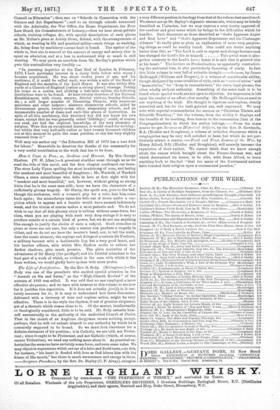How it Came to Pass; or, &edtime and Harvest. By
Mrs. George Skelton. (W. H. Allen.)—A prescient shudder went through us as we read the title of this novel, and the first chapter confirmed our fears. 'The stern Lady Upton spoiling the most headstrong of sons, and hating the meekest and most beautiful of daughters ; Mr. Warfield, of Warfield Chase, a stern misanthrope who falls in love at first sight with the 4meekest and most beautiful," not, however, without giving us strong hints that he is the same man still ; here we have the characters of a sufficiently gloomy tragedy. Sir Harry, the spoilt son, goes to the bad, though the authoress, with a woman's pity for a rake, lets him come back again; the misanthrope turns his wife out of doors under a sus- picion which to anyone not a lunatic would have seemed ludicrously weak, and the victim of coarse makes a most pathetic end. We do not wish to say that all this gloomy story is written without some force, but then, when you are playing with such very deep strings it is easy to produce sounds of a certain kind of power, but we do not see anything like enough to justify the choice of such a subject. Good comedies in prose or verse are not rare, but only a master can produce a tragedy in either, and we do not see here the master's hand, nor, to tell the truth, does the comic element, the sayings and doings of a certain Sir Frederic, a military baronet with a fashionable lisp, but a very good heart, and his brother officers, with which Mrs. Skelton seeks to relieve her darker shadows, give much promise. The plain narrative of the adventures of Sir Harry (the prodigal) and his faithful attendant is the best part of a work of which, so evident is the care with which it has been written, we would gladly have spoken with more praise.


































 Previous page
Previous page